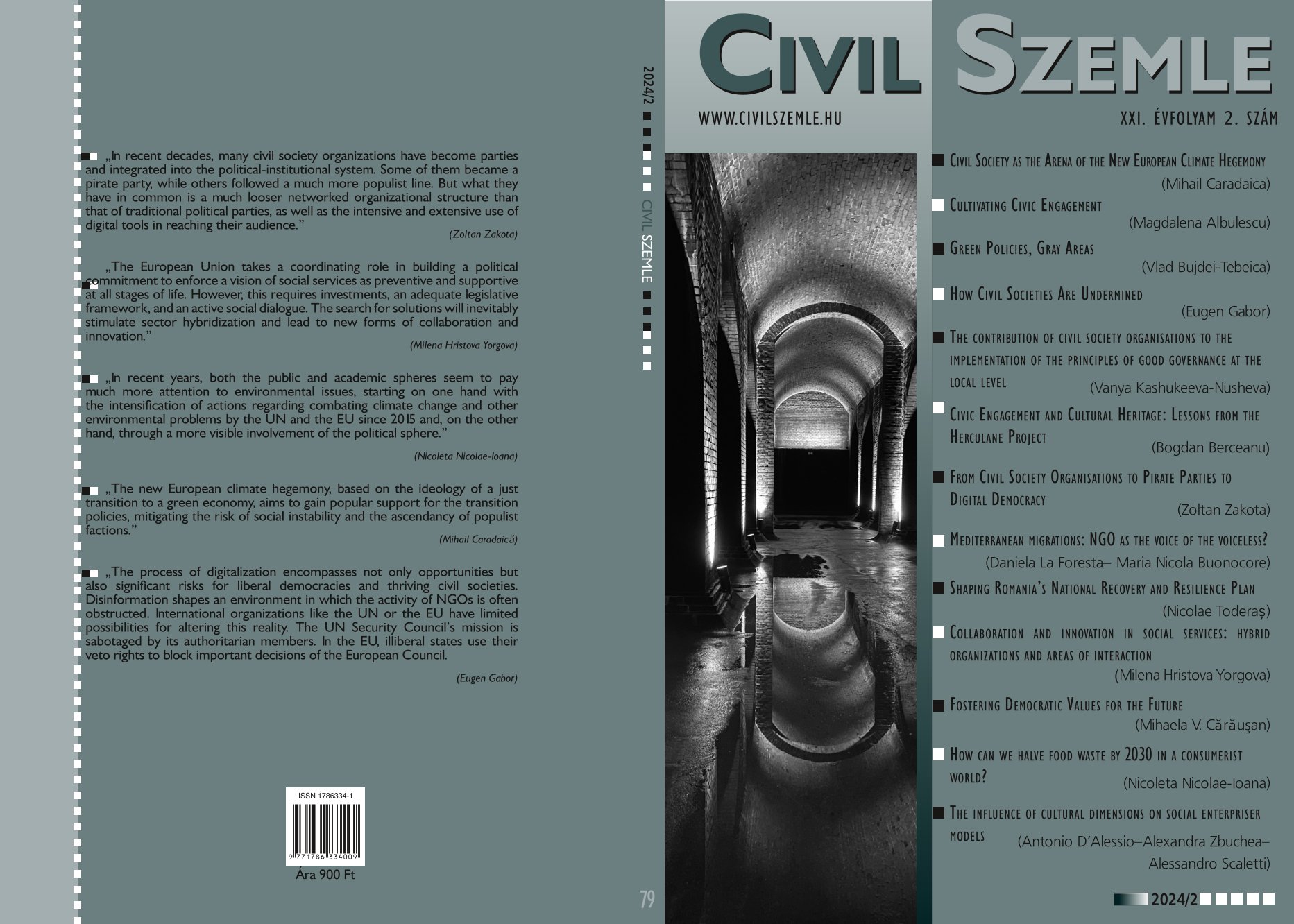Fostering Democratic Values for the Future
An In-Depth Exploration of Romania's Preuniversity Education System
Absztrakt
delving into the subjects that contribute to the democratic values frame. We will investigate the active role of individuals in shaping cultural norms and emphasize the importance of their participation in manifesting democratic power within the state. Moreover, the study questions whether the education system effectively prepares the future generation to be responsible members of society. The paper starts with the concept of co-creation and assesses whether individuals are ready to understand or know its implications. It reviews the empowerment of individuals as active decision-makers in societal processes and their ability to critically reflect on social movements and evolution. Furthermore, the research explores whether the upcoming generation possesses values that enable them to reject or aspire to different ideologies. In addressing the relationship between individuals and civil society, the paper investigates when and how nongovernmentalorganizations play a role in the education of future generations' values. An essential aspect of the study is an analysis of the education system's contribution to promoting Sustainable Development Goals (SDGs) in Romania. The research evaluates whether citizens have the necessary values to protect and support a sustainable future. The methodological framework for the paper is structured around a combination of qualitative and quantitative research methods, such as literature and document review, content and comparative analysis, and a multidisciplinary approach to gather comprehensive insights. Through this comprehensive examination, the paper aims to contribute valuable insights and recommendations for enhancing Romania's preuniversity education system, strengthening civil society, and promoting a sustainable future.
Hivatkozások
Appleton, J. (Ed.) (2014): Values in sustainable development. London: Routledge, https://doi.org/10.4324/9780203080177
Balázs, László–Rajcsányi-Molnár, Mónika–András, István–Sitku, Krisztina (2020): Social responsibility in higher education: a Hungarian best practice. Civil Szemle Különszám, 1., pp. 55–173.
Bellah, Robert–Madsen, Richard–Sullivan, William M.–Swidler, Ann–Steven M. Tipton, (1985): Habits of The Heart. Berkeley: University of California Press. https://doi.org/10.1126/science.231.4739.749.b
Brady, H. E.–Sidney, Verba–Kay, L. Schlozman (1995): Beyond SES: A Resource Model of Political Participation. American Political Science Review, 89., pp. 271–94. https://doi.org/10.2307/2082425
Burgess, M. M. (2012): Deriving policy and governance from deliberative events and mini-publics. In: Howlett M. and Laycock D. (Eds.): Regulating Next Generation Agri-Food Biotechnologies: Lessons from European, North American and Asian Experiences. New York: Routledge, pp. 220–236. https://doi.org/10.4324/9780203123324
Clarke, J. (2005): New Labour’s citizens: Activated, empowered, responsibilised, abandoned? Critical Social Policy, 25., (4.), pp. 447–463. https://doi.org/10.1177/0261018305057024
Contandriopoulos, D. (2004): A sociological perspective on public participation in health care. Social Science–Medicine, 58., (2.), pp. 321–330. https://doi.org/10.1016/S0277-9536(03)00164-3
Cornwall, A.–Coelho, V. S. P. (2007): Spaces for Change? The Politics of Citizen Participation in New Democratic Arenas. London: Zed.
Fung, A.–Wright, E. O.–Abers, R. (2003): Deepening Democracy: Institutional Innovations in Empowered Participatory Governance. London; New York: Verso. https://doi.org/10.1177/0032329201029001002
Gastil, J.–Levine, P. (2005): The Deliberative Democracy Handbook: Strategies for Effective Civic Engagement in the Twenty-First Century. San F rancisco: Jossey-Bass.
Hamilton, M. (2006). "Integral metamap creates common langua ge for urban c hange", Journal of Organizational Change Management, 19., (3.), pp. 276–306. https://doi.org/10.1108/09534810610668319
Isin, E. F. (2009). Citizenship in flux: The figure of the activist citizen. Subjectivity, 29., (1.), pp. 367–388.
Isin, E. F.–Turner, B. S. (Eds.) (2002): Handbook of Citizenship Studies. London: SAGE. https://doi.org/10.4135/9781848608276.n19
LG Horlings (2015): The inner dimension of sustainability: personal and cultural values. Current Opinion in Environmental Sustainability, Volume 14., pp. 163–169, https://doi.org/10.1016/j.cosust.2015.06.006.
Marinetto, M. (2003): Who wants to be an active citizen? The politics and practice of community involvement. Sociology, 37., (1.), pp. 103–120. https://doi.org/10.1177/0038038503037001390
Martin, G. P. (2010): Public participation in state governance from a social-theoretical perspective. In: Currie G., Ford J., Harding N., et al. (Eds.): Making Public Services Management Critical. London: Routledge, pp. 102–118.
Moore, M. (1993). Declining to learn from the East: The World Bank on governance and development. IDS Bulletin, 24., (1.), pp. 39–50.
Polgár, I. J. (2023): The Role of Civil Society Organisations in Migration Management. Cooperation between Public Authorities and Civil Society Actors at the EU’s South Eastern Borders. Civil Szemle, 24., pp. 27–40.
Putnam, R. D. (1993a): “The Prosperous Community: Social Capital and Public Life.” The American Prospect, 13., pp. 35–42.
Rose, N. (1996): The death of the social? Re-figuring the territory of government. Economy and Society 25., (3.), pp. 327–356.
Rowe, G.–Frewer L. J. (2005): A typology of public engagement mechanisms. Science, Technology,–Human Values, 30., (2.), pp. 251–290. https://doi.org/10.1177/0162243904271724
Schinkel, W.–Van Houdt, F. (2010): The double helix of cultural assimilation and neoliberalism: Citizenship in contemporary governmentality. British Journal of Sociology, 61., (4.), pp. 696-715.
Schlozman, K. L.–Verba, S.–Brady, H. E. (1999): “Civic P articipation and the Equality P roblem,” In: T. Skocpol–M. Fiorina (Eds.): Civic Engagement in American Democracy, pp. 427–59. Washington, DC: Brookings Institution Press.
Schwartz, S. H. (2009): Basic H uman Values: An Ov erview. Theory, Methods and Applications.
Stolle, D. (1998): Bowling Together, Bowling Alone: The Development of Generalized Trust in Voluntary Associations. Political Psychology, 19., pp. 497–525.
Tocqueville, Alexis De. (1969/1835): Democracy in America. New York: Harper.
Tönnies, F. (1940): Fundamental Concepts of Sociology. New York: American Book Company. Verba, Sidney–Kay L. Schlozman–Henry E. Brady (1995): Voice and Equality: Civic V oluntarism in American Politics. Cambridge, MA: Harvard University Press. https://doi.org/10.2307/j.ctv1pnc1k7
Wilson, J. (2000): Volunteering. Annual Review of Sociology, 26., pp. 215–40. https://doi.org/10.1146/annurev.soc.26.1.215
Eurobarometer on democracy-citizenship (528:2023), retrieved at https://europa.eu/eurobarometer/surveys/detail/2971.
Flash Eurobarometer ‘How do we build a stronger, more united Europe? The views of young people (478:2019), retrieved at https://europa.eu/eurobarometer/surveys/detail/2224 .
Flash Eurobarometer on ecolabel (535:2023), retrieved at https://europa.eu/eurobarometer/surveys/detail/3072.
Romanian National Action Plan Sustainability (2020), available in Romanian at https://dezvoltaredurabila.gov.ro/planul-national-de-actiune-final.
Special Eurobarometer on climate change (538:2023), retrieved at https://europa.eu/eurobarometer/surveys/detail/2954.
Special Eurobarometer on fairness perceptions of the green transition (527:2022), retrieved at https://europa.eu/eurobarometer/surveys/detail/2672.
Special Eurobarometer on justice, rights, and values (514:2021), retrieved at https://europa.eu/eurobarometer/surveys/detail/2269.
UNESCO, (2023). What you need to know about education for sustainable development, retrieved at https://www.unesco.org/en/education-sustainable-development/need-know#
World Development Report (1997). The State in a Changing World. New York: Oxford University Press.



